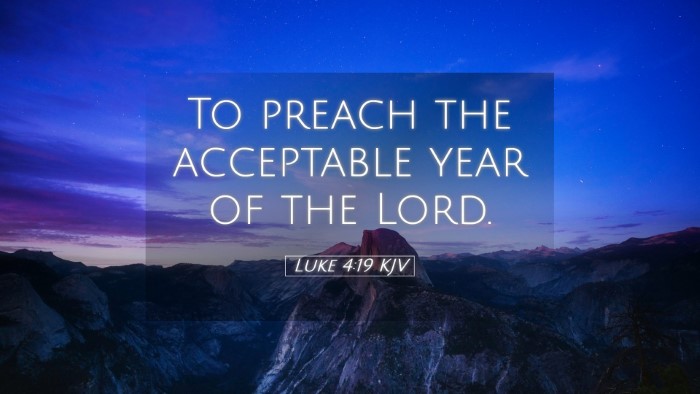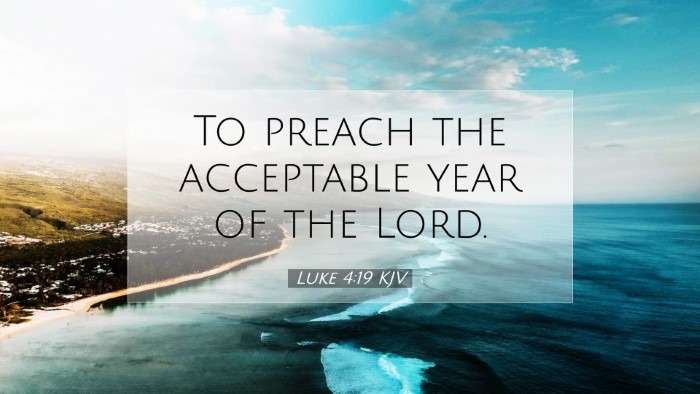Commentary on Luke 4:19
Luke 4:19 states: "To proclaim the year of the Lord's favor." This verse emerges within the context of Jesus’ inaugural reading from the scroll of Isaiah in the synagogue at Nazareth. It represents a pivotal moment in the ministry of Christ, encapsulating the fundamental themes of His mission and the fulfillment of prophecy.
Contextual Background
The reading itself comes from Isaiah 61:1-2, which speaks to the anointing of the Messiah and outlines His mission to the oppressed, the broken-hearted, and the captives. Jesus deliberately chooses this passage, indicating that He is the fulfillment of these ancient prophecies. The proclamation of the year of the Lord's favor, also known as the Jubilee year, signifies a time of liberation and restoration.
Insights from Matthew Henry
Matthew Henry emphasizes the significance of the phrase "the year of the Lord's favor." He notes that this period denotes a time when God graciously offers salvation and opportunity for repentance. Henry draws attention to the contrast between earthly kingdoms and the spiritual kingdom that Christ proclaims, indicating that the freedom He offers transcends mere physical liberation.
According to Henry, this proclamation is also about the continuation of grace, stressing that God's favor is not inherently earned but is freely given. He asserts that believers must recognize this season of grace and the urgency with which it must be embraced.
Insights from Albert Barnes
Albert Barnes provides a practical interpretation of this verse, explaining that Jesus' ministry centers on the announcement of mercy and grace to the downtrodden. He cites that the "year of the Lord's favor" refers not just to a temporal celebration but signifies an ongoing spiritual reality where Jesus fulfills the aspirations of the oppressed.
Barnes extends the interpretation to highlight the transformative nature of Christ's message. He notes that Christ's arrival inaugurates a new era in which individuals can find hope and restoration. This transformative power through faith in Christ is a central theme in Barnes' commentary, underscoring the believer's responsibility to recognize and operate within this era of grace.
Insights from Adam Clarke
Adam Clarke elaborates on the implications of the "year of the Lord's favor," linking it to the concept of Jubilee as outlined in Leviticus 25. Clarke articulates how the Jubilee was a divine institution intended to restore possessions and grant freedom. He draws parallels between this ancient practice and the freedom that Christ offers through His redemptive work.
Clarke emphasizes the liberative aspects of this verse, asserting that Christ comes to set free those who are spiritually and physically bound. He notes the holistic nature of Jesus' ministry, which addresses not only spiritual needs but also social injustices. Clarke's reflections encourage believers to embody the same spirit of liberation and hope that Christ exemplifies.
Theological Reflections
The theological significance of Luke 4:19 can be summarized into several key areas:
- Fulfillment of Prophecy: Jesus' reading directly affirms His messianic identity and the fulfillment of Isaiah's words.
- Grace and Redemption: The announcement of favor speaks to the overarching theme of God's grace available to humanity through faith in Christ.
- Social Justice: This passage emphasizes the importance of addressing societal issues, as Jesus engages with the marginalized and oppressed.
- Hope for the Future: The year of the Lord's favor implies an eventual restoration and hope that extends beyond the temporal, inviting believers to anticipate the fulfillment of God's promises.
Practical Applications
For pastors and theologians, this passage offers rich ground for reflection and application:
- Preaching about Grace: Use the concept of the year of the Lord's favor to remind congregations of God’s unmerited favor and the call to embrace salvation.
- Engaging with Social Issues: Inspire congregations to become advocates for justice and mercy in their communities, following Christ’s example.
- Encouraging Faith: Encourage individuals struggling with bondage—whether spiritual or otherwise—by proclaiming Christ’s redemptive message.
- Teaching about Prophecy: Educate congregations on the significance of prophetic fulfillment in recognizing Jesus as the Messiah.
Conclusion
Luke 4:19 serves as a cornerstone for understanding the nature of Christ’s mission and the transformation He seeks to bring about in the lives of all people. Through the insights shared from Matthew Henry, Albert Barnes, and Adam Clarke, it is clear that this proclamation invites believers to embrace the freedom, hope, and grace that Christ offers.


